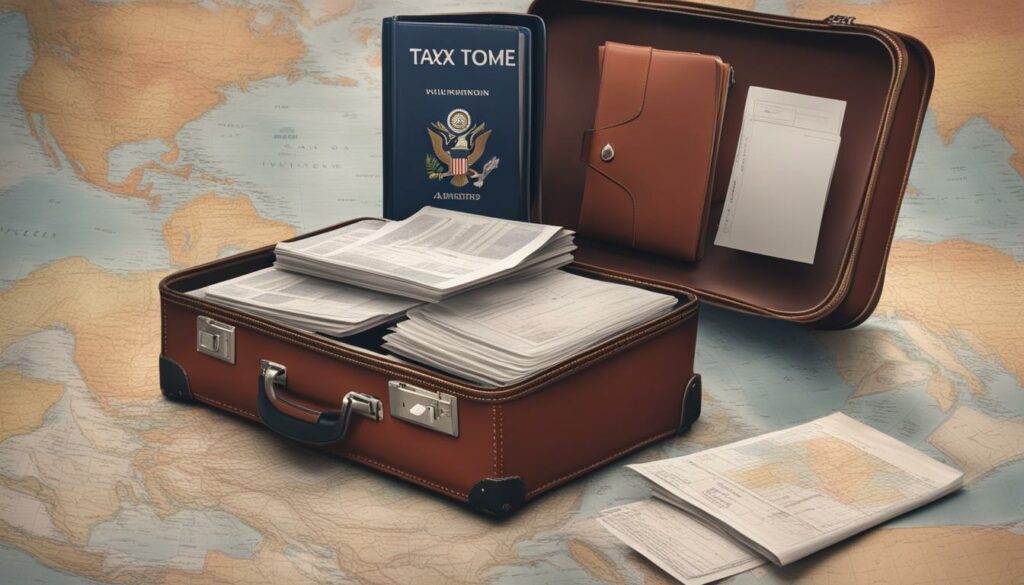Navigating travel nurse taxes can be challenging, but with the right knowledge and strategies, you can maximize your deductions and minimize your taxable income. Read on about our tax tips for travel nurses. As a travel nurse, you have unique tax considerations that differ from staff nurses. Understanding these differences and implementing the right tax planning techniques can help you optimize your financial situation.
One key aspect of travel nurse taxes is the distinction between taxed income and non-taxed payments known as stipends. Stipends cover expenses like housing, meals, and work-related costs and are not subject to taxes. However, to qualify for these tax-free payments, you must have a tax home, which is the area where you earn the majority of your income.
To make the most of your tax situation, it’s crucial to keep track of your expenses and maintain proper documentation. By doing so, you can maximize deductions and reduce your taxable income. Additionally, seeking the guidance of a tax professional who specializes in healthcare professionals can provide you with valuable tax advice specific to your profession.
Key Takeaways:
- Travel nurses have different tax considerations than staff nurses
- Stipends are non-taxed payments that cover expenses like housing and meals
- To qualify for tax-free stipends, you must have a tax home
- Keeping track of expenses and maintaining documentation is essential for maximizing deductions
- Consulting with a tax professional who specializes in healthcare professionals is recommended
Understanding Taxable and Non-Taxable Income for Travel Nurses
As a travel nurse, it’s important to have a clear understanding of taxable and non-taxable income to effectively plan your taxes and maximize your deductions. Read the tax tips for travel nurses below. By knowing the difference between these two types of income, you can make informed decisions about your finances and optimize your tax planning strategies.
Travel nurses have the unique opportunity to receive non-taxable income in the form of stipends. These stipends are considered reimbursements for job-related expenses and are not subject to taxes. They typically cover expenses such as housing, meals, and other work-related costs.
To qualify for non-taxable income, travel nurses must ensure that they duplicate their living expenses while on assignment. This means that if you’re receiving a housing stipend, you should be paying for your housing separately out of pocket. By duplicating your expenses, you can demonstrate to the IRS that your stipend is truly a reimbursement and not taxable income.
On the other hand, some travel nurses may prefer taxable income. While taxable income is subject to taxes, it can have certain advantages. It can impact factors such as social security contributions and loan eligibility. By earning taxable income, you may have a higher reported income, which can be beneficial if you’re planning to apply for loans or mortgages in the future.
Maximizing tax deductions for travel nurses involves properly understanding both taxable and non-taxable income. By keeping detailed records of your expenses and understanding the tax rules and regulations, you can ensure that you’re accurately reporting your income and taking advantage of all available deductions and credits.
It’s important to consult with a tax professional who specializes in tax planning for traveling nurses. While these tax tips for travel nurses are good ideas, always consult a professional. They can provide you with personalized advice and guidance tailored to your unique financial situation. A tax professional can also help ensure that you’re compliant with all tax laws and regulations, giving you peace of mind during tax season.
Key Takeaways:
- Travel nurses have the opportunity to receive non-taxable income in the form of stipends.
- Non-taxable income is considered a reimbursement for job-related expenses and is not subject to taxes.
- To qualify for non-taxable income, travel nurses must duplicate their living expenses while on assignment.
- Some travel nurses may prefer taxable income due to its impact on factors such as social security contributions and loan eligibility.
- Consulting with a tax professional who specializes in tax planning for traveling nurses is highly recommended to maximize deductions and ensure compliance.
Establishing a Tax Home and Meeting the Requirements
One for the first tax tips for travel nurse is: stipends! To qualify for non-taxable stipends as a travel nurse, it is crucial to establish a tax home. A tax home refers to the geographical location where you earn the majority of your income. It may be different from your permanent home. There are two ways to establish a tax home:
- The first option is to have your primary residence as your main area of income. This means that you earn a significant portion of your income in the vicinity of your permanent home.
- The second option is to prove that you visit your primary residence at least once every 12 months and incur expenses to maintain it. This includes expenses such as rent or mortgage payments, utility bills, and other associated costs.
Understanding the requirements for establishing a tax home is essential to avoid being taxed on your stipend payments. By meeting the qualifications, you can take advantage of the tax advantages and strategies available to nurses on the go.

Establishing a tax home not only helps protect your stipend payments from taxation but also allows you to maximize your tax deductions and reduce your taxable income. By staying informed and meeting the necessary requirements, you can navigate the complexities of tax preparation for healthcare travelers.
State Income Taxes and Filing Requirements for Travel Nurses
As travel nurses venture across different states, it’s essential to understand the implications of state income taxes and the filing requirements that come with them. While some states may not have income taxes, the majority do, and it’s crucial for travel nurses to be aware of their obligations to ensure compliance and maximize savings. Staying informed about tax tips for travel nurses and employing tax-saving strategies can make a significant difference in your financial well-being.
The Importance of Being Tax Savvy
Travel nurses often work in multiple states throughout the year, resulting in potential tax liabilities in each state where they have practiced. By familiarizing themselves with state income tax laws and regulations, traveling nurses can make informed decisions about their finances and optimize their tax planning.
“As a travel nurse, your income tax responsibilities may vary depending on the states in which you work. It’s crucial to understand the specific filing requirements and nuances of each state’s tax laws to avoid penalties and ensure compliance.”
Filing in Multiple States
When working in multiple states, travel nurses should be prepared to file income tax returns in each state where they have rendered their services. Additionally, they must also consider their permanent tax home state, which is the location where they maintain their tax residency. It’s important to note that each state may have different laws regarding non-resident tax returns, and adhering to these requirements is crucial to avoid any potential legal repercussions or financial penalties.
Seeking Professional Guidance
Given the complexity of filing taxes across multiple states, travel nurses may benefit from engaging the services of a tax professional experienced in multi-state tax filing. These professionals can ensure compliance with all relevant state regulations, maximize deductions, and navigate the intricacies of tax-saving tips for traveling nurses. Consulting with a tax expert can provide peace of mind and help optimize your tax strategy.
| State | Income Tax Rate | Filing Threshold |
|---|---|---|
| California | 10.23% | $16,617 |
| Texas | No State Income Tax | N/A |
| Florida | No State Income Tax | N/A |
| New York | 8.82% | $8,500 |
Table: State Income Tax Rates and Filing Thresholds for Select States
Remember, tax tips for travel nurses can help you navigate the intricacies of state income taxes and maximize your savings. By staying informed, seeking professional guidance, and complying with state filing requirements, you can ensure a smooth and successful tax season.
Tax Tips for Travel Nurses Recap
Filing taxes as a healthcare traveler can be complex and overwhelming. However, with proper planning and guidance, it can be a manageable process. One key aspect for healthcare travelers to consider is tax preparation. By keeping track of their expenses, maintaining proper documentation, and seeking professional tax advice, healthcare travelers can maximize their tax deductions and credits.
Starting the tax preparation process early is crucial. This allows healthcare travelers to gather all the necessary documentation and ensure they are well-prepared for filing their taxes. It is also important to file taxes by the deadline to avoid penalties and unnecessary stress.
Consulting with a certified tax professional who specializes in travel nursing is highly recommended. These professionals have the expertise to navigate the specific complexities that healthcare travelers face when it comes to taxes. They can provide tailored advice and guidance, ensuring healthcare travelers take full advantage of all available deductions and credits.
While tax season may seem daunting, being proactive and organized can make the process smoother. By following these tax preparation tax tips for travel nurses and working with a trusted tax professional, healthcare travelers can navigate the complexities of travel nurse taxes and minimize their tax liability.
Learn More Financial Strategies
What are some essential tax tips for travel nurses?
Travel nurses should keep track of their expenses, maintain proper documentation, and consult with a tax professional to maximize deductions and minimize taxable income.
What is the difference between taxable and non-taxable income for travel nurses?
Taxable income is subject to income tax, while non-taxable income, such as stipends received by travel nurses, are reimbursements for job-related expenses and are not taxed.
How can travel nurses establish a tax home?
Travel nurses can establish a tax home by having their primary residence as their main area of income or providing evidence of visiting their primary residence at least once every 12 months and incurring expenses to maintain it.
Do travel nurses have to pay state income taxes in multiple states?
Yes, travel nurses may need to pay state income taxes in each state where they have worked. Each state may have different laws regarding non-resident tax returns.
How can travel nurses navigate the complexities of filing taxes?
Travel nurses should seek professional tax advice, maintain organized records, and file their taxes by the deadline. Working with a tax professional familiar with travel nurse taxes is recommended.




